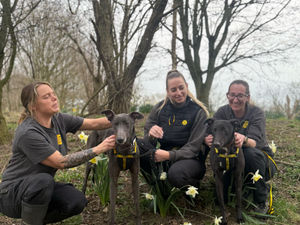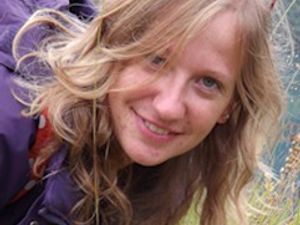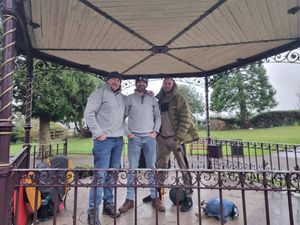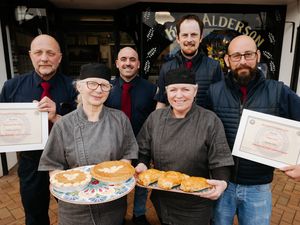Bridgnorth remembers day of Luftwaffe bombing
Seventy-five years ago today, Bridgnorth was about to undergo punishment from the German Luftwaffe.
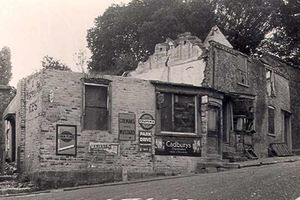
Two people died and a trail of destruction was left in their wake when the raid started at 1.30am on August 29, 1940.
A total of 12 bombs were dropped on a town that Hitler had apparently earmarked as being his base following the Nazi invasion. Pound Street, Church Street and St Mary's Street were all hit during the raid, which took Bridgnorth public by surprise.
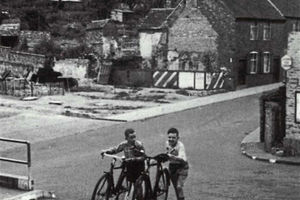
Cliff Cottage, occupied by two sisters, was destroyed and killed 62-year-old Josephine Maynard. One dropped on St Leonard's Close near the dentists and another hit 9 Church Street, destroying the cottage killing Elizabeth Hand, 68, and severely injuring her husband.
The area had not been targeted before and would not be hit again throughout the war but for some reason the peaceful market town was struck on that fateful day.
Historian Clive Gwilt said the German raiders were probably following the river to find their way and unloaded a string of bombs on the town en route. He said: "The largest was an oil bomb, which was dropped on Pound Street near the Squirrel Hotel and others were dropped around the town without fatalities.
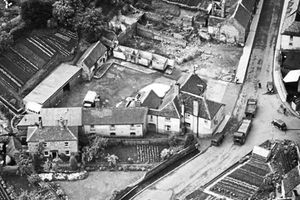
"The Church Street cottage was never rebuilt but remains a garden of remembrance for the two ladies who lost their lives.
"Cliff Cottages is now Mould Court and the Squirrel Hotel is now Squirrel Court."
Funds for the memorial garden were raised by JWC Bowers, while he was Mayor of Bridgnorth, and opened by his successor, Percy Blackford, on May 5, 1952. A metal plaque on the adjacent Almshouse records some of the history.
Mr Gwilt said Hitler's links to Bridgnorth meant Apley House, which the Fuhrer is believed to have wanted to use as his base had the Nazis successfully conquered Britain, was not targeted.
Mr Gwilt said he was hopeful a business would come forward to sponsor a more permanent reminder of the day the bombs dropped in Bridgnorth. Any businesses wishing to support the idea can contact Mr Gwilt on clive.gwilt@sky.com
Chance meeting with stranger who helped in familys rescue
Ted Hand was on Air Raid Precautions duty in Bridgnorth on that fateful night – a night which ended with him helping to dig out his fatally injured mother from the rubble of her bombed home and to rescue his father, his sister and niece.
It was one of the ironies of war that two of his relatives in that blitzed house had just arrived from near Cambridge.
There had been constant air raids and alerts there, with RAF bases being nearby, so coming to Bridgnorth would be safer – or so they had thought. "They had only been staying in the house with my grandparents for two days when the house in Church Street was bombed. They survived," said Hazel Gould, whose grandmother Elizabeth Hand was one of the two fatalities of the Bridgnorth Blitz.
Hazel's grandfather Frederick Hand was injured and died a few years later.
Her father Ted had businesses in the town and for him there was to be a curious sequel, as Hazel, who married and left Bridgnorth nearly 50 years ago – she now lives near Hereford – explains: "In the early 1950s my father drove a friend down to Heathrow. The airport was busy and a Canadian asked if he could join them.
"During conversation the usual questions were asked. When it came to my father's turn to reply he said he came from a town in Shropshire. You will understand his surprise when the Canadian replied 'Oh yes I know Bridgnorth. I was staying at a large house called Bella Vista near St Leonard's Church which was used for Canadian soldiers to convalesce. One night some bombs were dropped on the town and those who were fit were asked to help. I was sent to Church Street to help to rescue people in a house there – a woman had been killed'.
"My father and this complete stranger had worked side by side the night of the Bridgnorth bombs. It was quite a coincidence as the Canadian had previously not been back to the UK since the bombing."
That bombing of Bridgnorth was not the last time in the war that Shropshire was on the receiving end of Luftwaffe bombs.
Shortly before midnight on August 31, 1940, a bomb fell on a cottage on the outskirts of Shrewsbury, killing
Jessie Mary Broxton, 43, of Armstrong Cottages, Ellesmere Road, Shrewsbury, and her grandchildren John Terrence Meredith, four, and Margaret Eileen Meredith, six.
And in April 1941 two Cleobury Mortimer teens, both ARP messengers, were killed by a delayed action bomb which had fallen on high ground north of the town. They were Eddie Sutton, of Council Houses, New Road, and Ernie Edwards, of The Wells.


